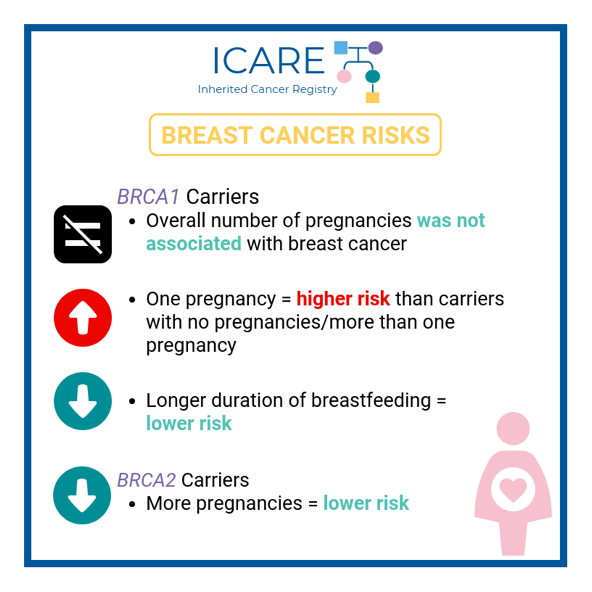 Looking at pregnancy history and breast cancer risk, a recent study of almost 8,000 women with BRCA1/2 mutations evaluated breast cancer risks related to pregnancy.1 Findings suggested the overall number of pregnancies was not associated with breast cancer risk in BRCA1 carriers; however, BRCA1 carriers with one pregnancy were at higher risk for breast cancer when compared to those with no pregnancies or more than one pregnancy. In contrast, among BRCA2 carriers, more pregnancies were associated with a lower breast cancer risk. Additionally, longer duration of breastfeeding in BRCA1 carriers lowered breast cancer risks. Looking at risks of contralateral breast cancer after removal of the ovaries, in a study of over 2,000 women with a BRCA1 or BRCA2 mutation and almost 10 years of follow-up, results suggested that removal of the ovaries did not reduce the chance of developing a second new breast cancer.2 This finding did not change with type of BRCA1/2 mutation or age at diagnosis of the first breast cancer. Overall, these findings suggest that removing the ovaries in BRCA1/2 carriers with breast cancer may not reduce their risk for developing another breast cancer. Looking at Non-Hodgkin lymphoma risks, in a study of pediatric cancer survivors, results suggested that children and adolescents with a BRCA2 mutation may have a higher risk for non-Hodgkin lymphoma, with a significant association (Odds Ratio of 5; 95% Confidence Interval: 2.1-10.2).3 These findings contribute to refining cancer risks among those with BRCA1/2 mutations and require confirmation through other studies.
Looking at pregnancy history and breast cancer risk, a recent study of almost 8,000 women with BRCA1/2 mutations evaluated breast cancer risks related to pregnancy.1 Findings suggested the overall number of pregnancies was not associated with breast cancer risk in BRCA1 carriers; however, BRCA1 carriers with one pregnancy were at higher risk for breast cancer when compared to those with no pregnancies or more than one pregnancy. In contrast, among BRCA2 carriers, more pregnancies were associated with a lower breast cancer risk. Additionally, longer duration of breastfeeding in BRCA1 carriers lowered breast cancer risks. Looking at risks of contralateral breast cancer after removal of the ovaries, in a study of over 2,000 women with a BRCA1 or BRCA2 mutation and almost 10 years of follow-up, results suggested that removal of the ovaries did not reduce the chance of developing a second new breast cancer.2 This finding did not change with type of BRCA1/2 mutation or age at diagnosis of the first breast cancer. Overall, these findings suggest that removing the ovaries in BRCA1/2 carriers with breast cancer may not reduce their risk for developing another breast cancer. Looking at Non-Hodgkin lymphoma risks, in a study of pediatric cancer survivors, results suggested that children and adolescents with a BRCA2 mutation may have a higher risk for non-Hodgkin lymphoma, with a significant association (Odds Ratio of 5; 95% Confidence Interval: 2.1-10.2).3 These findings contribute to refining cancer risks among those with BRCA1/2 mutations and require confirmation through other studies.
1Terry, et al. JNCI Cancer Spectr. 2018 Dec. PMID: 30873510.
2Kotsopoulos, et al. Breast Cancer Res Treat. 2019 Jun. PMID: 30756284.
3Wang, et al. JAMA Oncol. 2019 Jul. PMID: 31343663.
